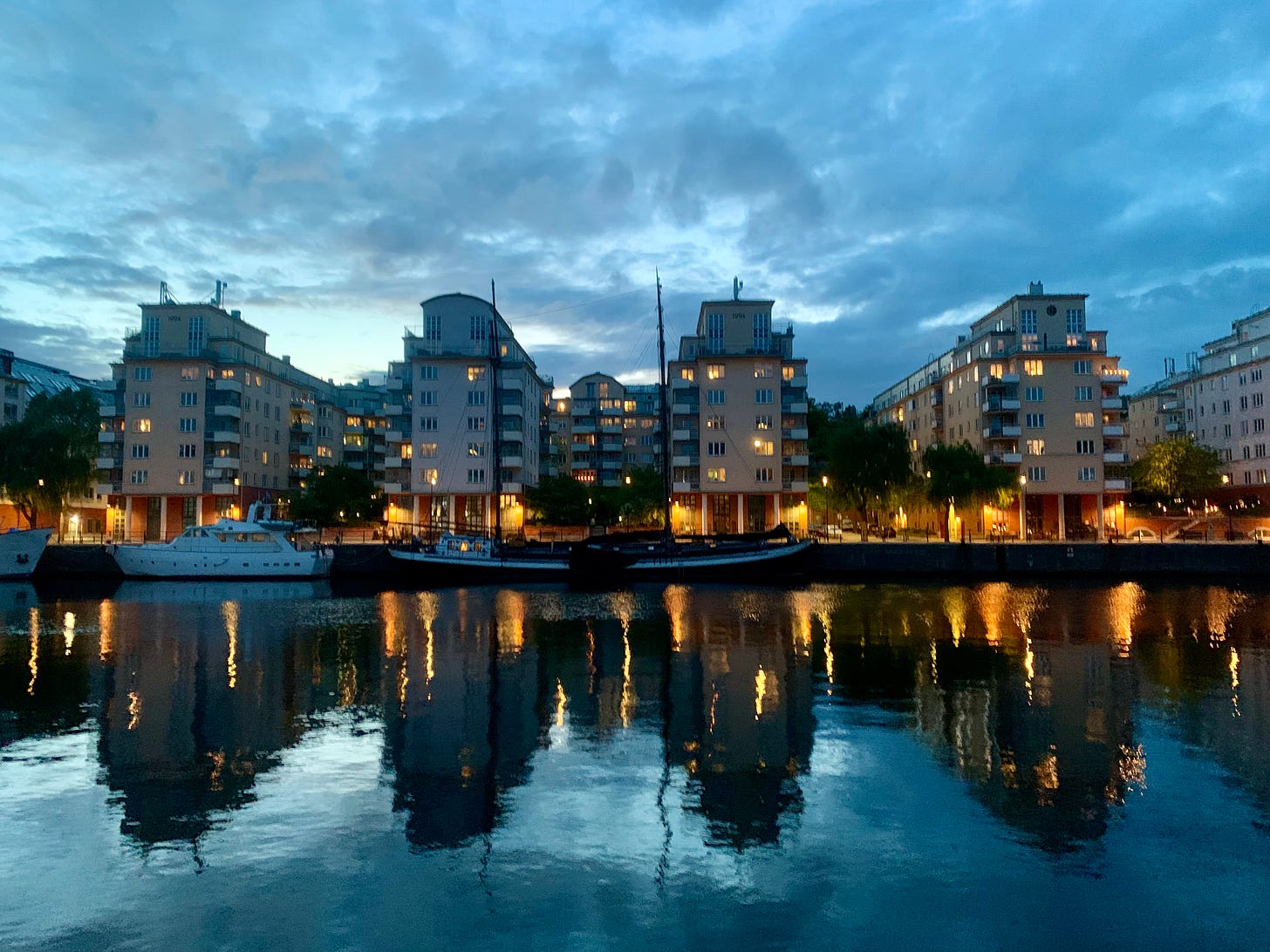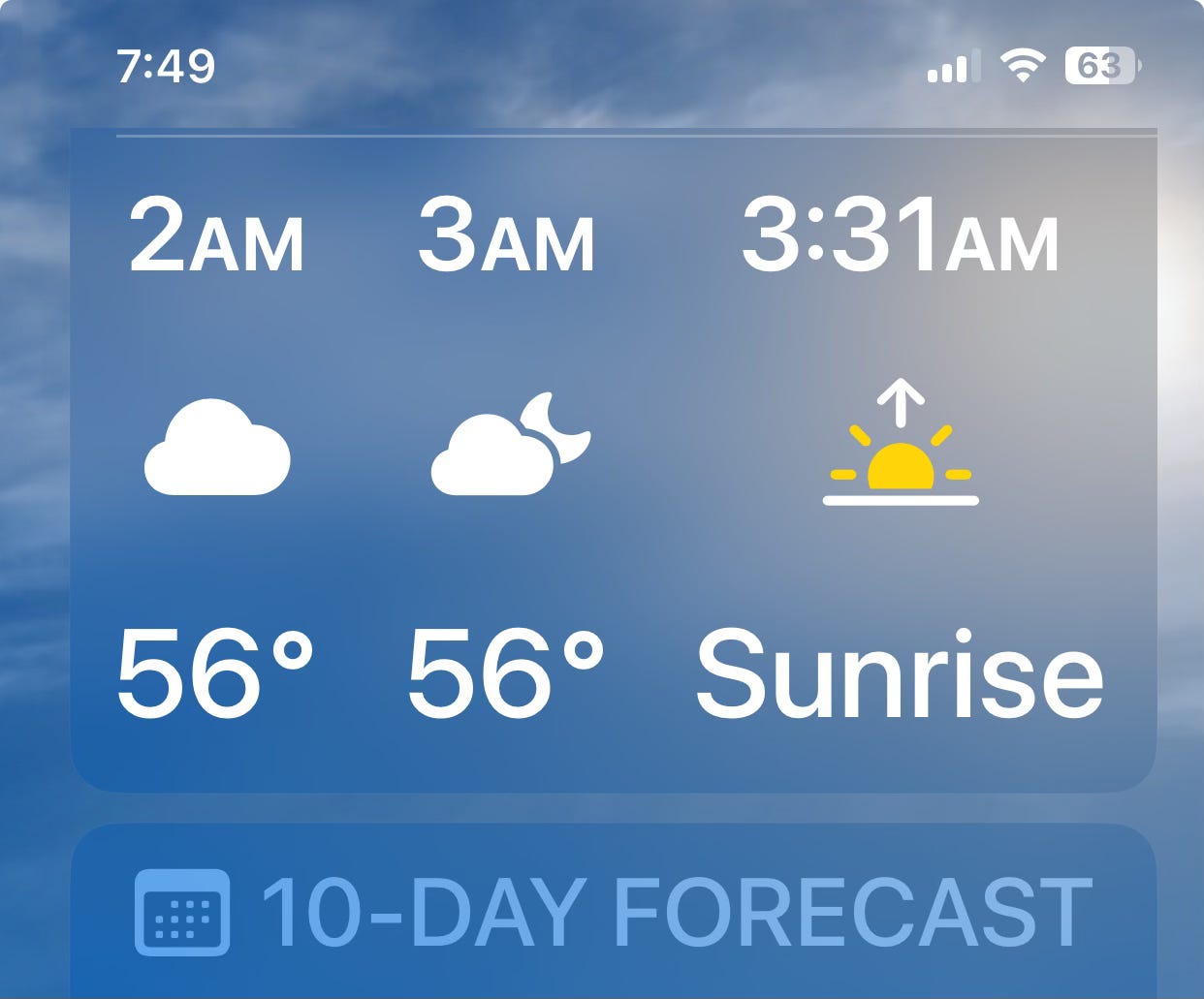In Russia, they call this time of year the White Nights and in Norway, the Nightless Night. In Alaska, it’s known as the Midnight Sun and, technically, also here in Sweden (midnattssol). But in practice, no one here really calls it anything. It simply is.
Sweden’s biggest holiday, Midsummer, takes place on the summer solstice. On that day, the sun sets at 10:07 PM and rises at 3:31 AM and in the interim it never really gets dark. The sky just changes blue from light to dark. The word “solstice” translates roughly to “sun stands still” because of the way it seems to hang endlessly in the sky.
The festival of Midsummer, also known as Litha, has thousands of years of history. It was adopted by the Celts, but its origins are Germanic Pagan and its roots may date as far back as the Neolithic. Midsummer is a sabbat in celebration of the sun, the light’s triumph over darkness and the abundance it brings us.
For about a month and a half, the sun is below the horizon for less than six hours and no one sleeps properly. The siege begins in mid-May, just as you’ve arrived at full confidence that the snows are over. You’ve only just put away your winter coat. Somehow, you’re never really ready for it. You feel groggy for a few days in a row. You keep waking up way too early. Then it hits you: The light is back.
Summer sleep strategy is an art here. Some swear by valerian root capsules, others prefer lavender aromatherapy. For me, it’s melatonin tablets and magnesium oil and hot tea. Every year, I fish out the dried chamomile flowers from the back of the kitchen cabinet and then I consider my bedroom windows. Every year, I devise a new plan for blocking the light. Every year, I fail.
The sun seeps in around the blackout shades, no matter how cleverly you tape up the seams. It cascades into the room before 4 AM and surges in past your sleep mask, even if it’s as tight as a vise. Your brain knows the light is there, even if your eyes are closed. Your skin knows, too. No matter what you do to block it, the signal is somehow sent, somehow received: Rise and shine. You can fight it if you like and try to go back to sleep, but you’ll lose the battle. You’ll be fully awake and the hours ahead of you will be foggy and endless.
When I cannot take another walk, I clean out drawers and organize closets and make lists. There is so much time in the summer. In a sense, though, we are lucky in Stockholm. Way up north, in Kiruna, the sun doesn’t set at all between late May and mid July. In Svalbard, Norway, it’s even worse: From around mid April to mid August, it’s perennial daylight. People lose their grip. The light can make you manic and the sleep deprivation can make you half insane.
It’s probably my age, but in the past few weeks, I’ve become more clear-seeing. Time does this. It brings a startling clarity. The stars have fallen from my eyes and in this strong, magic light, all is laid out, all the things I knew but didn’t want to see. I can see all the lies I told myself, and the beautiful stories, too. They are dead now because I have killed them but I live on, somehow stronger for it. I will never stop fighting my private wars and one of them is for this, for the truth. I figure I won.
Midsummer is summer’s blazing high point. The flowers are in glorious bloom and the bees are buzzing. But the holiday also signifies something less joyful: The season is ending. After Midsummer, the days begin to grow shorter again. Soon the light will die and the world will return to shadow. The corollary to June, when the sun never sets, is November, when the sun never rises. The polar night can feel like it will never end.
The Romans considered Sweden a “land beyond God” and even now, when I haven’t slept for days, when I have a scratch on my cheek from trying to tighten my sleep mask, even now this cracks me up. I picture the bewildered Roman soldier who somehow made it this far north, I see him surveying the lichen-covered rocks and the tundra and the stark landscape. He has waged combat against the earth’s fiercest principalities and powers, but he can’t begin to fight this, the light and the dark.
There are no weapons for this.
Here, you’re nature’s bitch, and all you can do is like it or not. Someone said the other day that these extremes of light and dark make them feel more connected to nature. Me, I feel less connected than schooled. It is saying: Listen. There is beauty in the dark and even something good can be too much and, in any case, you can’t escape your season.
This morning at 4:00 AM, I sat outside under a light sky and watched the daylilies open. I thought about when I was young and believed everything anyone told me. That version of me has been gone for a long time. Now I know more than I want to know and I see more than I want to see. But that’s how the light is. It shows you everything.





Light seems most welcome right now as those of us back in the USA are living through some very dark times. Thanks Laura for your pieces. I always like reading them.
Yes, this is Sweden :) If you feel detached from nature, then try dismissing the melatonin and face mask. Then you may not sleep at all, but that's nature.
Btw., when I wanted to buy melatonin, I found out that it's available only on prescription here in Sweden. But shops abroad have no problems sending it here, so it is still available, even if you can't convince a doctor that you need it.
I think that the way the year changes makes nature more alive. It may be difficult to sleep at times, but it is so anyway because the Swedes are so noisy (in my experience, anyway), and the fact that you can see the light change day by day makes you feel a movement.